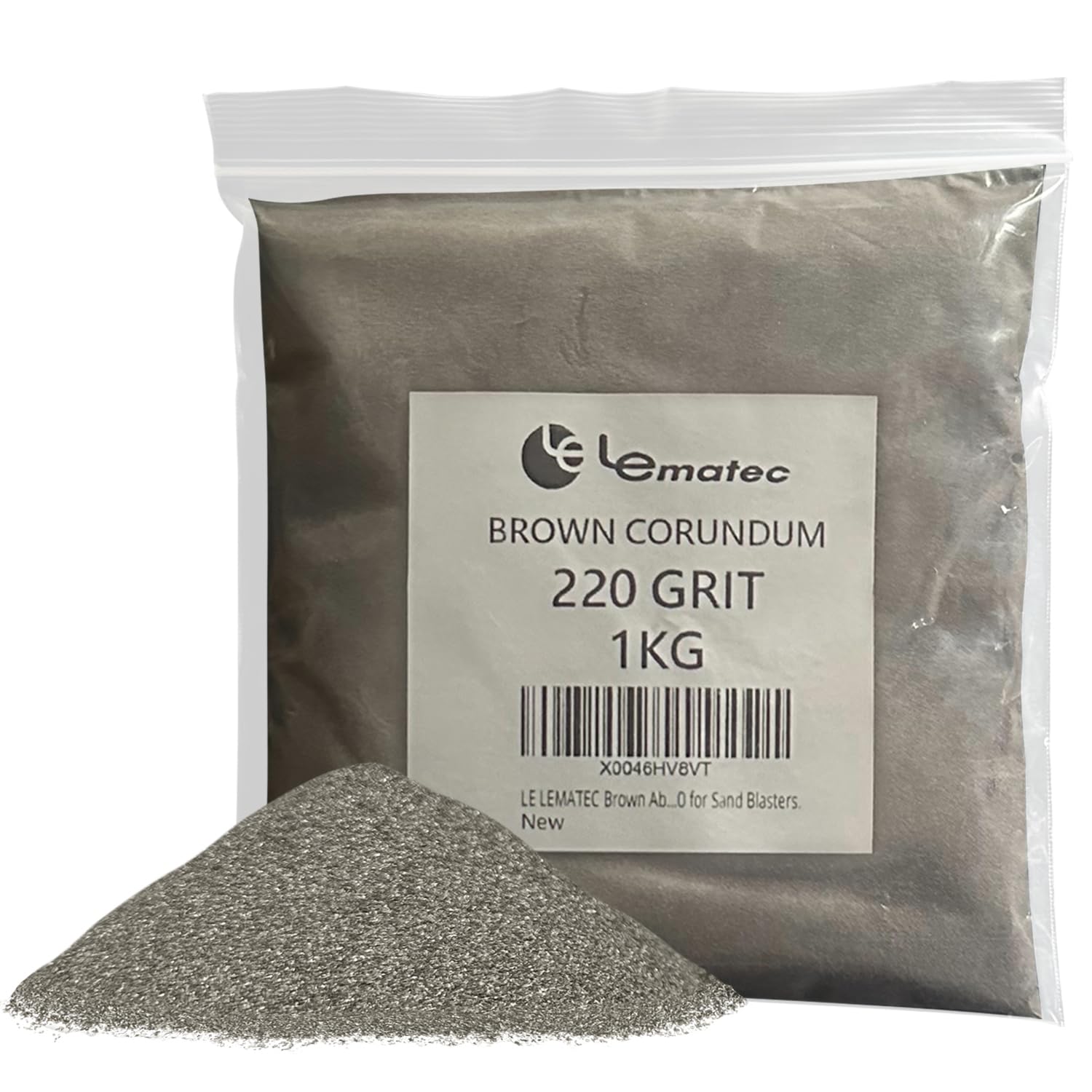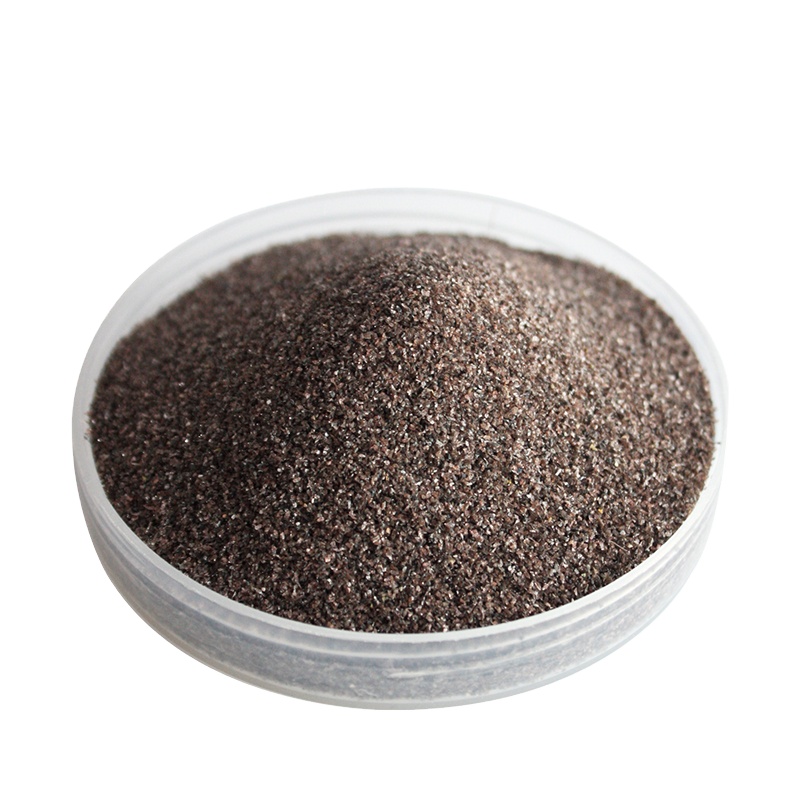Understanding the essential technical properties of brown corundum abrasives is crucial for B2B buyers, especially when sourcing materials that meet specific application needs. Here are several critical specifications to consider:
Material Grade
The material grade of brown corundum defines its hardness and durability. Typically graded on a scale from F10 to F120, higher numbers indicate finer abrasives. Selecting the appropriate grade is vital for achieving optimal performance in applications such as grinding, polishing, and blasting. For international buyers, understanding the grading system can help in choosing a product that aligns with industry standards and application requirements.
Particle Size Distribution
The particle size distribution (PSD) affects the abrasive's cutting performance and surface finish. Buyers should look for suppliers who provide detailed PSD data, often expressed in microns or mesh sizes. A consistent PSD ensures uniformity in production processes, which is especially important for manufacturers in sectors like automotive and metalworking.
Bulk Density
Bulk density measures how much mass of abrasive is contained in a given volume. This property influences the efficiency of the abrasive during use, impacting both cost-effectiveness and performance. Higher bulk density can lead to better packing efficiency and reduced waste, which is a key consideration for buyers looking to optimize logistics and inventory management.
Hardness
Hardness is a critical factor that determines the abrasive's ability to cut through materials. Brown corundum typically has a hardness rating of 9 on the Mohs scale, making it suitable for various applications. Buyers must assess the hardness relative to the materials they intend to process to ensure compatibility and effectiveness.
Toughness
Toughness refers to the abrasive's ability to withstand impact without fracturing. A tougher abrasive is less likely to break down during use, providing longer-lasting performance. This is particularly significant for heavy-duty applications in industries such as construction and manufacturing, where durability is paramount.
Familiarity with industry terminology can streamline communication and negotiations between buyers and suppliers. Here are several essential trade terms:
OEM (Original Equipment Manufacturer)
OEM refers to companies that produce parts or equipment that may be marketed by another manufacturer. Understanding OEM relationships is crucial for buyers seeking specific abrasives that are compatible with their machinery or production processes.
MOQ (Minimum Order Quantity)
MOQ indicates the smallest number of units a supplier is willing to sell in a single order. Knowing the MOQ helps buyers plan their purchasing strategies, ensuring they meet supplier requirements while balancing their inventory levels.
RFQ (Request for Quotation)
An RFQ is a formal document that a buyer sends to suppliers requesting pricing and other details for specific products. This term is essential for buyers looking to obtain competitive pricing and terms from multiple suppliers before making a purchase decision.
Incoterms (International Commercial Terms)
Incoterms are a set of predefined commercial terms that define the responsibilities of buyers and sellers in international transactions. Familiarity with Incoterms helps buyers understand shipping obligations, risk management, and cost responsibilities, which is particularly important for international procurement.
Certification Standards
Certification standards, such as ISO 9001 or ANSI, indicate that a supplier adheres to specific quality management systems. For buyers, verifying these certifications can ensure that they are sourcing from reputable suppliers who meet industry regulations and quality expectations.
By comprehending these technical properties and trade terms, international B2B buyers can make informed decisions when sourcing brown corundum abrasives, ensuring they select the right products for their operational needs.
The brown corundum abrasive market is currently experiencing significant growth, driven by various global factors. The increasing demand for high-performance abrasives across diverse industries, including automotive, construction, and metalworking, is a primary driver. Additionally, the rise in manufacturing activities in emerging markets, particularly in Africa and South America, is contributing to this trend. The shift towards automation and advanced manufacturing techniques is also fostering demand for more durable and efficient abrasive materials.
Moreover, the emergence of innovative B2B technologies, such as e-commerce platforms and digital supply chain management systems, is transforming sourcing practices. International buyers are increasingly leveraging these platforms for better access to suppliers, facilitating smoother transactions and enhanced price transparency. In Europe and the Middle East, buyers are prioritizing suppliers who can offer quick turnaround times and reliable logistics, reflecting a broader trend towards just-in-time manufacturing.
Sustainability and ethical sourcing have become central concerns for international B2B buyers in recent years. The environmental impact of abrasive production, particularly regarding energy consumption and waste generation, necessitates that buyers consider suppliers who adhere to sustainable practices. This includes sourcing brown corundum from manufacturers that utilize eco-friendly extraction and production methods.
The importance of ethical supply chains cannot be overstated. Buyers from Africa, South America, the Middle East, and Europe are increasingly scrutinizing the origins of their materials and the labor practices involved in their production. Certifications such as ISO 14001 for environmental management and Fair Trade can serve as indicators of a supplier's commitment to sustainable practices. By prioritizing suppliers with these certifications, businesses can enhance their brand reputation and appeal to environmentally conscious consumers.
The evolution of the brown corundum abrasive sector dates back to the mid-20th century when the industrial revolution spurred demand for efficient and durable abrasive materials. Initially sourced from natural deposits, technological advancements allowed for the synthetic production of brown corundum, enhancing its properties and making it more accessible to manufacturers.
Over the decades, the brown corundum market has adapted to changing industry needs, with continuous improvements in quality and application versatility. Today, the sector is characterized by a diverse range of suppliers, from large multinational corporations to small local producers, catering to an increasingly globalized market. This historical context underscores the importance of understanding not just the present dynamics but also the legacy of innovation that has shaped the current landscape of brown corundum abrasives.
Navigating the market dynamics and sourcing trends in the brown corundum abrasive sector requires a strategic approach. International B2B buyers must be attuned to the key market drivers, emphasize ethical sourcing practices, and understand the historical evolution of the industry to make informed purchasing decisions. By aligning with suppliers who share a commitment to sustainability and innovation, buyers can enhance their competitive edge in a rapidly changing market.

A stock image related to brown corundum abrasive suppliers.
How do I choose the right brown corundum abrasive supplier for my business needs?
Choosing the right supplier involves assessing their product quality, certifications, and industry experience. Look for suppliers with ISO certifications and a strong track record in your specific industry. Engage in direct communication to understand their technical expertise and willingness to provide customized solutions. Additionally, request samples to evaluate the abrasives' performance in your applications before making a bulk purchase.
What are the typical minimum order quantities (MOQs) for brown corundum abrasives?
MOQs can vary significantly between suppliers and depend on the specific product type. Generally, MOQs for brown corundum abrasives range from 1 ton to 10 tons. It’s essential to discuss your requirements with potential suppliers, as many are willing to negotiate MOQs, especially for first-time buyers or long-term partnerships. This flexibility can help you manage inventory costs effectively.
What payment terms should I expect when sourcing brown corundum abrasives internationally?
Payment terms vary by supplier and region but typically include options like advance payment, letters of credit, or net 30/60 days. For international transactions, it’s common to negotiate partial upfront payments with the balance due upon delivery. Always clarify payment terms in your contract to avoid misunderstandings and ensure both parties are protected.
How can I verify the quality of brown corundum abrasives before purchasing?
To verify quality, request certificates of analysis (CoA) and product samples for testing. Look for suppliers who provide detailed specifications, including grit size, purity, and consistency. Additionally, consider third-party testing services to evaluate the abrasives against industry standards. Engaging with suppliers who have robust quality assurance processes can further enhance your confidence in their products.
What logistics considerations should I keep in mind when sourcing abrasives from overseas?
Logistics play a crucial role in international sourcing. Consider factors such as shipping methods, lead times, and customs regulations specific to your region. It’s advisable to partner with suppliers who have established logistics networks and can provide insights into shipping costs and delivery timelines. Additionally, ensure that the supplier can accommodate your preferred delivery terms, whether it’s Ex-Works, FOB, or CIF.
Can brown corundum abrasives be customized for specific applications?
Yes, many suppliers offer customization options for brown corundum abrasives to meet specific application requirements. Customization may include adjustments to grit size, shape, or even chemical composition. When discussing your needs with potential suppliers, provide detailed information about your application to ensure they can deliver a product that meets your expectations.
What are the common uses of brown corundum abrasives in different industries?
Brown corundum abrasives are widely used in various industries, including metalworking, construction, and automotive. They are commonly utilized for grinding, polishing, and cutting applications due to their hardness and durability. Understanding the specific needs of your industry can help you select the appropriate type and grade of abrasive, ensuring optimal performance in your operations.
How do I assess the reliability of a brown corundum abrasive supplier?
Assessing reliability involves reviewing supplier credentials, customer testimonials, and industry reputation. Conduct thorough research, including checking online reviews and industry forums. Engaging in direct conversations with the supplier about their production processes, quality control measures, and after-sales support can provide valuable insights into their reliability. Establishing a trial order can also help gauge their service levels before committing to larger purchases.

A stock image related to brown corundum abrasive suppliers.
The information provided in this guide, including content regarding manufacturers, technical specifications, and market analysis, is for informational and educational purposes only. It does not constitute professional procurement advice, financial advice, or legal advice.
While we have made every effort to ensure the accuracy and timeliness of the information, we are not responsible for any errors, omissions, or outdated information. Market conditions, company details, and technical standards are subject to change.
B2B buyers must conduct their own independent and thorough due diligence before making any purchasing decisions. This includes contacting suppliers directly, verifying certifications, requesting samples, and seeking professional consultation. The risk of relying on any information in this guide is borne solely by the reader.
In navigating the complexities of sourcing brown corundum abrasives, international B2B buyers must prioritize strategic partnerships with reliable suppliers. Understanding regional market dynamics—particularly in Africa, South America, the Middle East, and Europe—can significantly enhance procurement efficiency. Buyers should focus on suppliers who offer not only quality materials but also transparency in their sourcing and production processes. This approach not only mitigates risks but also fosters long-term relationships that can lead to favorable pricing and consistent supply.
Strategic sourcing is essential in ensuring that your organization secures the best value in brown corundum abrasives. By leveraging data analytics and supplier performance metrics, buyers can make informed decisions that align with their operational needs and budget constraints. Additionally, engaging with suppliers who demonstrate sustainability practices can enhance your brand reputation and appeal to environmentally conscious consumers.
As global demand for abrasives continues to rise, the landscape for sourcing brown corundum will evolve. Buyers should stay ahead of market trends by embracing innovation in materials and processes. Collaboration with suppliers who invest in technology and sustainable practices will be crucial for maintaining a competitive edge.
In conclusion, international B2B buyers are encouraged to adopt a proactive approach in their sourcing strategies. By fostering strong supplier relationships and staying informed about market trends, you can ensure a robust supply chain that meets your business needs.
Tags: Black Silicon Carbide, White Fused Alumina, Brown Fused Alumina, Pink Fused Alumina, Black Fused Alumina